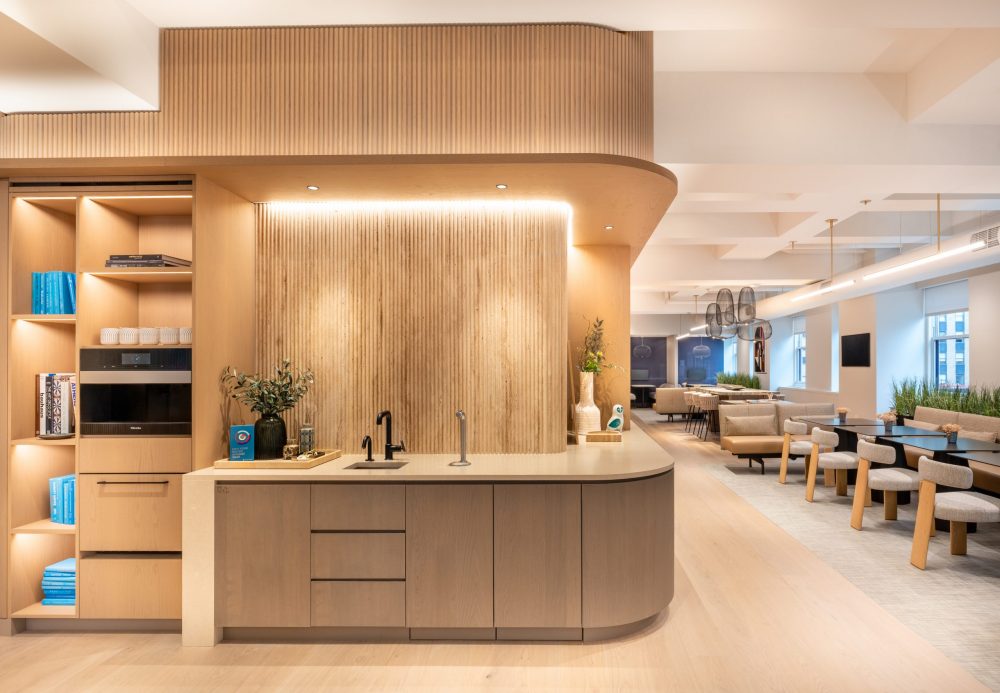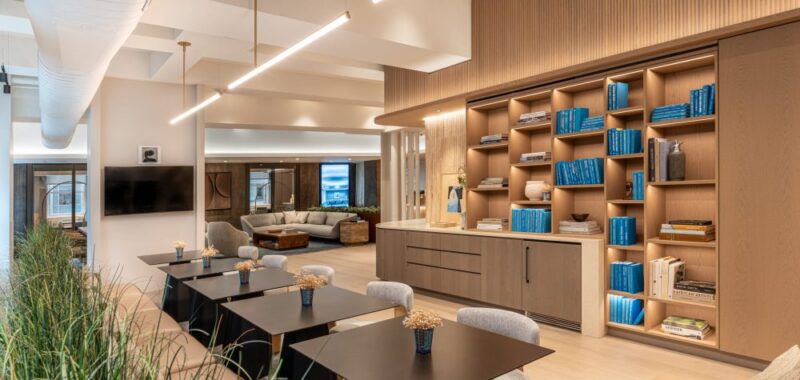Ted Moudis Associates‘ Nicole Zack is kicking off WDM’s Café and Restroom Feature: Workplace Edition. Her article reveals the impact of cafés in the workplace and their future as a place of empowerment. Stay tuned for more inspiration and insights for all things café and restroom.
In today’s evolving workplace landscape, the break rooms of the past are transforming into vibrant, experiential café spaces that act as the heart of modern offices. No longer just a quick stop to fill up your coffee mug, these new environments are spaces to build community and foster connection. More than simply an escape from the desk, work cafés invite people to stay, collaborate and feel a genuine sense of belonging. Our recent project exemplifies this transformation, turning a previously functional area into a dynamic social environment where teammates want to gather.
It’s not a space; it’s an experience.

Hospitality Meets the Workplace
Today’s café spaces embrace a hospitality-driven approach, designed to create intentional environments where employees feel valued. It is about curating a bespoke experience. The atmosphere draws on cozy, quirky, and localized elements, warm lighting, varied seating and that perfect hum of ambient noise that is proven to boost creativity. These cafés are destinations, “places to go to, not through,” serving as multi-purpose hubs where employees connect and collaborate in ways that go beyond work.

Crafting an Immersive Experience
Picture the ideal café experience: the soft clinking of cups, the rich aroma of freshly ground beans and a curated jazz playlist setting the perfect vibe. It’s the feel of the Hasami porcelain mug in your hands and the excitement of discovering a local brew that keeps things fresh and unexpected. You sink into the plush velvet lounge chair for a while, then nestle into a snug booth by the window.
The barista knows your order and the chef is growing fresh microgreens in the café’s own hydroponic garden. The evolution of café spaces goes beyond a design trend; it signals a cultural shift in how we view the workplace. It’s not just about completing tasks, but about enjoying the process of work. In this space, time feels expansive, borrowing from the concept of “Fika” to pause and savor coffee and conversation as an integral part of the day. These are the details that elevate an ordinary break into a cherished ritual, a moment to slow down and recharge.
The “Coffee Shop Effect” from Anonymous to Together
Why are coffee shops always packed, with the best seats often claimed? They strike the perfect balance between solitude and community. The buzz creates an environment that fosters focus without distraction. It’s all about being “anonymous yet together,” a feeling that workplace cafés are increasingly designed to capture. These spaces allow employees to work independently while still feeling part of a larger, vibrant community. Every element is thoughtfully designed to enhance life at work.

A Case Study in Connection: The Transformation of our “East Side Diner”
Our New York office is a prime example of how a café can become a cultural centerpiece. What was once a functional space, where employees refilled their water bottles, grabbed a banana, and moved on, has transformed into a vibrant community hub. The shift from two floors to one unified space has strengthened team connections and created a natural flow where the café is not just a destination, but a central point employees must pass through, fostering spontaneous connections.

Perfect for gatherings and social events, the cafe fully embodies the idea of “Change your space, change your culture.” Our New York office is a testament to how a thoughtfully designed café space can reshape workplace culture. It has led to a more collaborative environment; instead of merely stopping by, employees now meet in booths, sketch ideas, enjoy impromptu chats at banquette seating, or simply relax.
The café now features curated artwork and personalized touches that reflect the Greek heritage of TMA’s founding principals. With an abundance of design books for inspiration, fresh fruit, snacks, and the much-loved pebble ice machine, the café offers more than just functionality. A rich layering of textures, handcrafted details, and carefully selected finishes bring warmth and style to every corner. This café reflects how intentional design can transform not just a space, but the entire culture of a workplace.
Future Café Spaces: Where Do We Go From Here?

As work evolves, with generative AI handling more mundane tasks, the value of creative thought and human connection increases. Will workplace cafés evolve into purely social hubs or venues for event-based work? What will draw people in next? What will make them stay longer, engage more deeply, and feel a stronger sense of belonging in the workplace?
We are moving toward a future where these spaces will be deeply embedded in the fabric of work life, serving as platforms for creativity, connection and innovation. Imagine a café that adapts various dayparts seamlessly, offering quiet nooks for morning reflection, technology to connect with colleagues across the globe and lively gathering spots for after-work karaoke. These spaces could evolve with their user’s preferences, featuring art installations that change with the seasons or pop-ups that introduce employees to local culture and cuisine. Future cafés will be dynamic and ever-changing, rooted in the communities they serve, offering awe and delight daily.

The challenge for designers is to create environments that not only support work but celebrate the people doing it. As we look toward the next evolution of workplace cafés, we’re reminded of a simple truth: It’s not a space, it’s an experience. The future of café spaces is about the empowerment of the individual to work, socialize, or relax based on their individual needs. It will be a place designed to seamlessly blend curated artwork, thoughtful materiality, and tactile details while enhancing the sensory experience. Ultimately, these spaces will foster connection and inspire employees to bring their best selves to work every day.

